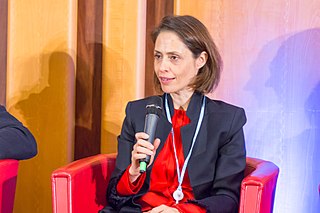Related Research Articles

Information warfare (IW) is the battlespace use and management of information and communication technology (ICT) in pursuit of a competitive advantage over an opponent. It is different from cyberwarfare that attacks computers, software, and command control systems. Information warfare is the manipulation of information trusted by a target without the target's awareness so that the target will make decisions against their interest but in the interest of the one conducting information warfare. As a result, it is not clear when information warfare begins, ends, and how strong or destructive it is.
The ethics of technology is a sub-field of ethics addressing the ethical questions specific to the Technology Age, the transitional shift in society wherein personal computers and subsequent devices provide for the quick and easy transfer of information. Technology ethics is the application of ethical thinking to the growing concerns of technology as new technologies continue to rise in prominence.
Computer ethics is a part of practical philosophy concerned with how computing professionals should make decisions regarding professional and social conduct.
Information ethics has been defined as "the branch of ethics that focuses on the relationship between the creation, organization, dissemination, and use of information, and the ethical standards and moral codes governing human conduct in society". It examines the morality that comes from information as a resource, a product, or as a target. It provides a critical framework for considering moral issues concerning informational privacy, moral agency, new environmental issues, problems arising from the life-cycle of information. It is very vital to understand that librarians, archivists, information professionals among others, really understand the importance of knowing how to disseminate proper information as well as being responsible with their actions when addressing information.

Luciano Floridi is an Italian and British philosopher. He is the director of the Digital Ethics Center at Yale University. He is also a Professor of Sociology of Culture and Communication at the University of Bologna, Department of Legal Studies, where he is the director of the Centre for Digital Ethics. Furthermore, he is adjunct professor at the Department of Economics, American University, Washington D.C. He is married to the neuroscientist Anna Christina Nobre.
The International Association for Computing and Philosophy (IACAP) is a professional, philosophical association emerging from a history of conferences that began in 1986. Adopting its mission from these conferences, the IACAP exists in order to promote scholarly dialogue on all aspects of the computational/informational turn and the use of computers in the service of philosophy.
Robot ethics, sometimes known as "roboethics", concerns ethical problems that occur with robots, such as whether robots pose a threat to humans in the long or short run, whether some uses of robots are problematic, and how robots should be designed such that they act 'ethically'. Alternatively, roboethics refers specifically to the ethics of human behavior towards robots, as robots become increasingly advanced. Robot ethics is a sub-field of ethics of technology, specifically information technology, and it has close links to legal as well as socio-economic concerns. Researchers from diverse areas are beginning to tackle ethical questions about creating robotic technology and implementing it in societies, in a way that will still ensure the safety of the human race.
The ethics of artificial intelligence is the branch of the ethics of technology specific to artificial intelligence (AI) systems.

Cyberethics is "a branch of ethics concerned with behavior in an online environment". In another definition, it is the "exploration of the entire range of ethical and moral issues that arise in cyberspace" while cyberspace is understood to be "the electronic worlds made visible by the Internet." For years, various governments have enacted regulations while organizations have defined policies about cyberethics.
Value sensitive design (VSD) is a theoretically grounded approach to the design of technology that accounts for human values in a principled and comprehensive manner. VSD originated within the field of information systems design and human-computer interaction to address design issues within the fields by emphasizing the ethical values of direct and indirect stakeholders. It was developed by Batya Friedman and Peter Kahn at the University of Washington starting in the late 1980s and early 1990s. Later, in 2019, Batya Friedman and David Hendry wrote a book on this topic called "Value Sensitive Design: Shaping Technology with Moral Imagination". Value Sensitive Design takes human values into account in a well-defined matter throughout the whole process. Designs are developed using an investigation consisting of three phases: conceptual, empirical and technological. These investigations are intended to be iterative, allowing the designer to modify the design continuously.
Machine ethics is a part of the ethics of artificial intelligence concerned with adding or ensuring moral behaviors of man-made machines that use artificial intelligence, otherwise known as artificial intelligent agents. Machine ethics differs from other ethical fields related to engineering and technology. It should not be confused with computer ethics, which focuses on human use of computers. It should also be distinguished from the philosophy of technology, which concerns itself with technology's grander social effects.
The cyber-arms industry are the markets and associated events surrounding the sale of software exploits, zero-days, cyberweaponry, surveillance technologies, and related tools for perpetrating cyberattacks. The term may extend to both grey and black markets online and offline.

Shannon Vallor is an American philosopher of technology. She is the Baillie Gifford Chair in the Ethics of Data and Artificial Intelligence at the Edinburgh Futures Institute. She previously taught at Santa Clara University in Santa Clara, California where she was the Regis and Dianne McKenna Professor of Philosophy and William J. Rewak, S.J. Professor at SCU.

Big data ethics, also known simply as data ethics, refers to systemizing, defending, and recommending concepts of right and wrong conduct in relation to data, in particular personal data. Since the dawn of the Internet the sheer quantity and quality of data has dramatically increased and is continuing to do so exponentially. Big data describes this large amount of data that is so voluminous and complex that traditional data processing application software is inadequate to deal with them. Recent innovations in medical research and healthcare, such as high-throughput genome sequencing, high-resolution imaging, electronic medical patient records and a plethora of internet-connected health devices have triggered a data deluge that will reach the exabyte range in the near future. Data ethics is of increasing relevance as the quantity of data increases because of the scale of the impact.
Limor Shmerling Magazanik is a thought leader in digital technology policy, ethics and regulation. She is an expert in data governance, privacy, AI ethics and cybersecurity policy. Since November 2018, she has been the managing director of the Israel Tech Policy Institute (ITPI) and a senior fellow at the Future of Privacy Forum. She is a visiting scholar at the Duke University Sanford School of Public Policy. Previously, for 10 years, she was director at the Israeli Privacy Protection Authority and an adjunct lecturer at the Hebrew University of Jerusalem Faculty of Law and the Interdisciplinary Center Herzliya School of Law and a research advisor at the Milken Innovation Center. Her background also includes positions in the private sector, law firms and high-tech industry. She has promoted policy initiatives in various technology sectors and has been an advocate for compliance with data protection and privacy by design.

Maria Virgínia Ferreira de Almeida Júdice Gamito Dignum is a Professor of Computer Science at Umeå University, and an Associated Professor at Delft University of Technology. She leads the Social and Ethical Artificial Intelligence research group. Her research and writing considers responsible AI and the development evaluation of human-agent team work, thereby aligning with Human-Centered Artificial Intelligence themes.
The regulation of artificial intelligence is the development of public sector policies and laws for promoting and regulating artificial intelligence (AI); it is therefore related to the broader regulation of algorithms. The regulatory and policy landscape for AI is an emerging issue in jurisdictions globally, including in the European Union and in supra-national bodies like the IEEE, OECD and others. Since 2016, a wave of AI ethics guidelines have been published in order to maintain social control over the technology. Regulation is considered necessary to both encourage AI and manage associated risks. In addition to regulation, AI-deploying organizations need to play a central role in creating and deploying trustworthy AI in line with the principles of trustworthy AI, and take accountability to mitigate the risks. Regulation of AI through mechanisms such as review boards can also be seen as social means to approach the AI control problem.

Wendell Wallach is a bioethicist and author focused on the ethics and governance of emerging technologies, in particular artificial intelligence and neuroscience. He is a scholar at Yale University's Interdisciplinary Center for Bioethics, a senior advisor to The Hastings Center, a Carnegie/Uehiro Senior Fellow at the Carnegie Council for Ethics in International Affairs, where he co-directs the "Artificial Intelligence Equality Initiative" with Anja Kaspersen. Wendell Wallach is also a fellow at the Center for Law and Innovation at the Sandra Day O'Connor School of Law at Arizona State University. He has written two books on the ethics of emerging technologies.: "Moral Machines: Teaching Robots Right from Wrong" (2010) and "A Dangerous Master: How to Keep Technology from Slipping Beyond Our Control" (2015). Wallach speaks eloquently about his professional, personal and spiritual journey, as well as some of the biggest conundrums facing humanity at the wake of the bio/digital revolution in this podcast published by the Carnegie Council for Ethics in International Affairs (CCEIA).

Eftychia ("Effy") Vayena is a Greek and Swiss bioethicist. Since 2017 she has held the position of chair of bioethics at the Swiss Institute of Technology in Zurich, ETH Zurich. She is an elected member of the Swiss Academy of Medical Sciences.
Automated decision-making (ADM) involves the use of data, machines and algorithms to make decisions in a range of contexts, including public administration, business, health, education, law, employment, transport, media and entertainment, with varying degrees of human oversight or intervention. ADM involves large-scale data from a range of sources, such as databases, text, social media, sensors, images or speech, that is processed using various technologies including computer software, algorithms, machine learning, natural language processing, artificial intelligence, augmented intelligence and robotics. The increasing use of automated decision-making systems (ADMS) across a range of contexts presents many benefits and challenges to human society requiring consideration of the technical, legal, ethical, societal, educational, economic and health consequences.
References
- ↑ "Dr Mariarosaria Taddeo". Google Scholar.
- ↑ "Recognition of Distinction" (PDF). University of Oxford Gazette. 154 (5397): 60–61. 12 October 2023. Retrieved 13 May 2024.
- ↑ "Dr Mariarosaria Taddeo". Springer.
- ↑ Taddeo, M. and Floridi, L (2017). The Responsibilities of Online Service Providers. Springer.
{{cite book}}: CS1 maint: multiple names: authors list (link) - ↑ Floridi, L., and Taddeo, M (2014). The Ethics of Information Warfare. Springer.
{{cite book}}: CS1 maint: multiple names: authors list (link)